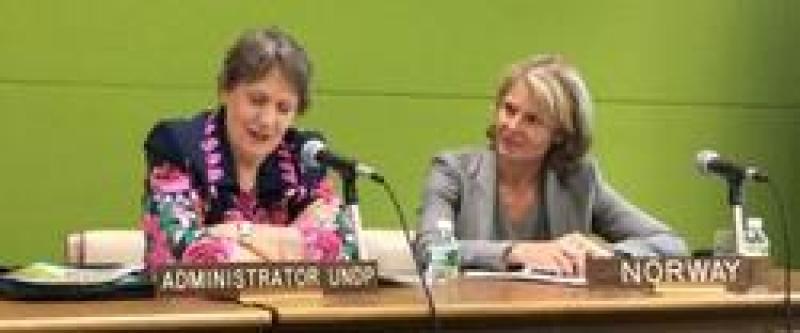

New York City – Three sources of finance - humanitarian, development and climate finance - play a critical role in supporting recovery efforts in fragile and conflict-affected countries, says a report launched today by Helen Clark, Administrator of the United Nations Development Programme (UNDP) and Chair of the United Nations Development Group (UNDG). The Report, by the UNDP Multi-Partner Trust Fund Office (MPTF Office), Financing Recovery for Resilience. (Read more...)
New York City – Three sources of finance - humanitarian, development and climate finance - play a critical role in supporting recovery efforts in fragile and conflict-affected countries, says a report launched today by Helen Clark, Administrator of the United Nations Development Programme (UNDP) and Chair of the United Nations Development Group (UNDG).
The Report, by the UNDP Multi-Partner Trust Fund Office (MPTF Office), Financing Recovery for Resilience: Enhancing the coverage, capitalization and coherence of pooled financing mechanisms for recovery to strengthen synergies between humanitarian, development and climate finance, indicates that these three sources of finance now operate independently of each other in funding recovery efforts. This reduces the effectiveness of recovery efforts and increases risks of financing gaps.
The Report comes at a time when protracted crises are straining the capacity of the international community to meet humanitarian needs. In 2014, the UN made its largest humanitarian appeal ever for $12.9 billion, including $6.5 billion for the crisis caused by the Syrian conflict. So far only 30 percent of the funds needed have been raised for Syria and neighboring countries.
“While there has been a tragic spike in violence and conflict in recent times, the longer term trends have been more encouraging. The number and magnitude of armed conflicts was estimated last year to have dropped by nearly half since the early 1990s,” said Helen Clark. “Climate change, however, is one of the threats which could generate more conflict. Projections suggest that it will greatly increase the competition for scarce resources between groups and countries which has been a traditional driver of violence and conflict.”
Miss Clark added that a more integrated resilience-based approach is needed - one that recognizes that poverty, crisis, conflict, and environmental degradation are, in fact, intertwined challenges and need to be addressed holistically.
The report underscores that pooled financing mechanisms can play a valuable role in aligning efforts across a wide range of actors and foster synergies across humanitarian, development and climate assistance. But it stresses that the capacity of recovery funds financed by development assistance to achieve this is constrained in terms of:
• Coverage—the development funds for recovery do not exist in the majority of countries or are established too late to promote links with humanitarian and climate assistance;
• Capitalization—the funds are too small and fragmented to support aid coordination and alignment;
• Coherence—they cover too many issues, leaving some key areas unaddressed.
The Report highlights opportunities to enhance the effectiveness of development funds in support of recovery efforts. They include:
• Better leveraging the potential of pooled funds to manage risk to enable an earlier release of development finance;
• Consolidating the large number of small recovery pooled funds into fewer, larger pooled funds to create a critical mass of resources that can coordinate recovery interventions across all three sources of finance;
• Promoting a common strategy across recovery efforts to help access, sequence and combine different sources of finance.
“As inter-governmental negotiations proceed on the post-2015 sustainable development agenda the financing instruments used to advance it need revamping. Through concerted action to align the financing instruments behind global agendas, we can co-ordinate our efforts better, and thereby boost the efficiency and effectiveness of support for fragile and conflict-affected states,” said Helen Clark.
Speakers at the launch also included H.E. Tina MØrch Smith, Ambassador of Norway to the United Nations and Yannick Glemarec, the MPTF Office Executive Coordinator.